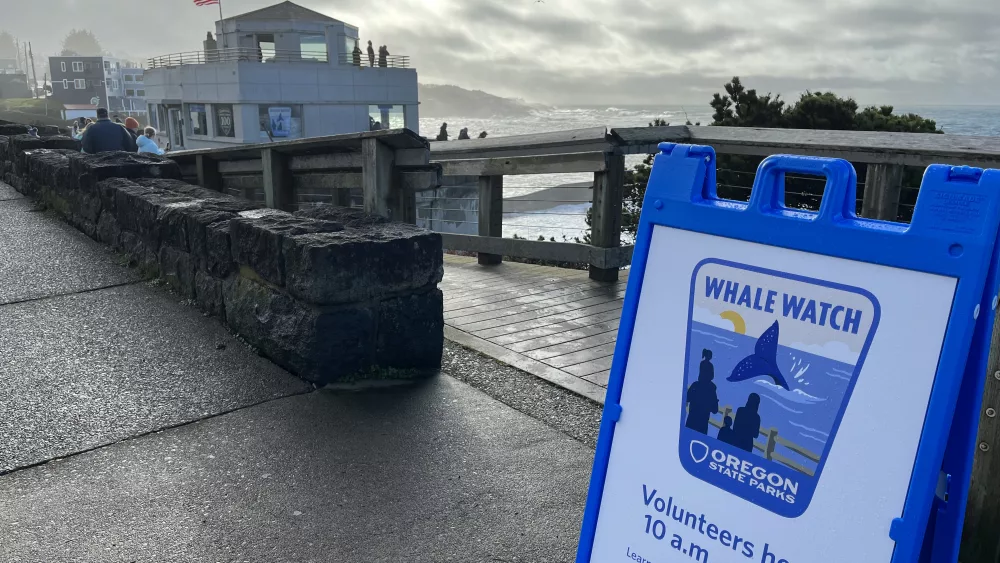Thursday, HB 4002 passed on the House Floor 51-7. Representative Emerson Levy proudly voted yes on the treatment-first plan brought forward by the Joint Committee on Addiction and Community Safety.
“The voters were clear when they passed Measure 110: getting people into recovery is the top priority. But, what we’ve experienced since the implementation of Measure 110 is unacceptable,” said Rep. Emerson Levy (D-Central Oregon). “HB 4002 is a comprehensive plan to address our state’s drug and addiction problem and gives our law enforcement the tools they need to confiscate hard drugs and get people off the street and into recovery.”
“Deschutes County has great reason to be proud of their statewide model of deflection services through the Deschutes County Stabilization Center. We have been doing this work for a long time, and we are set up and ready to use these dollars” says Levy.
The Deschutes County Stabilization Center (DCSC) is a collaborative project between the Deschutes County Sheriff’s Office and Deschutes County Health Services and offers the community a 24/7 crisis stabilization center. Holly Harris, the DCSC Behavioral Health Director, shared information about their services to the Joint Committee on Addiction and Community Safety during an informational hearing in Salem.
“For about 9 years we have offered a jail diversion program that is embedded within our stabilization center,” said Harris. “It is designed to keep individuals who are struggling with substance abuse disorders and mental health conditions out of the criminal justice system. We also offer a place for law enforcement to voluntarily bring us people instead of the emergency department or jail. We have a very robust partnership with our law enforcement agencies, and we have become reliant upon each other to do this work well. About 20% of the people we serve are already diverted from the criminal justice system. We also have a really wonderful relationship with our DAs office. Through our aid and assist work, we have tackled these issues together.”
Deschutes County District Attorney, Steve Gunnels, affirmed a dedication to fulfilling the obligations outlined in the bill when it was before the Joint Committee. After learning about its passage today, DA Gunnels said: “Central Oregonians expect their government to work for them and the first duty of government is public safety. This bill improves public safety by providing a real path to treatment for drug users and real accountability if that opportunity is not pursued. HB 4002 is the result of the excellent working relationships and communication between our legislators and our public health and public safety officials. Deschutes County will be a safer, more healthy place to live because of that collaboration.”
Through HB 5204, the budget companion bill to HB 4002 which also passed on the House Floor today, the Deschutes County Stabilization Center was granted $1.5 million to expand services. Through the same bill, BestCare, the largest substance abuse disorder treatment provider in central Oregon was awarded $525,000 to expand detox capacity in Central Oregon.
Rick Treleaven, the CEO at BestCare, offered this context when he appeared before the Joint Committee on Addiction and Community Safety: “Our belief is that the deflection services that you are envisioning will really fit into our system of care that exists, and we’ll build upon it. Best Care already provides the full range of treatment services: from outreach, harm reduction, rapid access to MAT, intensive outpatient detox, residential, the whole system is there. We have a long-established collaboration with Deschutes County. We don’t give up on people.”
HB 4002 allows for treatment instead of jail time, waives all fees and fines, and provides for early and automatic expungement.
Bend Chief of Police, Mike Krantz, is also supportive of the bill: “HB 4002 provides law enforcement with essential tools necessary for us to fulfill our commitment to community safety. Concurrently, it fortifies collaboration between law enforcement and Deschutes County Health Services. The robust partnership among the Deschutes County Stabilization Center, Community Crisis Response Teams, and local law enforcement is pivotal in shaping the envisioned deflection program for the future of Deschutes County.” says Krantz.
-0-
The group Oregonians For Safety & Recovery disagree, releasing the following statement:
Today, the Oregon House of Representatives made an error that will result in lifelong harm to countless Oregonians. They voted for a bill that will increase racial disparities in Oregon and disparities between counties, allow police and prosecutors to decide who gets treatment and who gets jail, convict thousands more people for personal possession, and overwhelm the court system, while failing to address the state’s addiction crisis. HB 4002 was drafted behind closed doors, leaving out the input of Black and brown people most affected by increased police power and without being informed by the input of addiction specialists or current science on addiction.
We would like to thank Representatives Chaichi, Nelson, Pham and Gamba, who stood with Black and brown Oregonians, people struggling with substance use, and our communities who were looking for real solutions from the 2024 legislature to the addiction and housing crisis in our communities.
Here are quotes from Oregonians for Safety and Recovery coalition partners:
Jennifer Parrish Taylor, Director of Advocacy and Public Policy, Urban League of Portland:
“Today, HB 4002 is being touted as a compromise, but we ask at the cost to whom? It is an unacceptable compromise when we know that there will be disparate impacts to Oregonians of color. It is not enough to monitor the system when we know it is a system that has bias built into it. I fear that we will be back next year, hearing those stories of harm, figuring out how to make our communities whole.”
Gloria Ochoa-Sandoval, Policy Director, Unite Oregon:
“Unite Oregon, representing Black, Indigenous, People of Color, immigrants, rural communities, and those experiencing poverty, strongly oppose HB 4002. This legislation exacerbates the challenges faced by those grappling with addiction, particularly impacting Black and brown Oregonians and those experiencing homelessness. By prioritizing punitive measures over equitable access to treatment, HB 4002 perpetuates systemic injustice. It joins a regrettable list of bills prioritizing political interests over the well-being of Oregon’s most vulnerable populations. We will remain steadfast in advocating for a paradigm shift towards healing and empowerment and commend the legislators who opposed HB 4002. Their courage in standing for justice does not go unnoticed.”
ShaToyia Bentley, Executive Director, The Ebony Collective Coalition:
“HB 4002 will be in the list of bills that Oregon has passed that have sacrificed low-income, unprotected and underrepresented Oregonians for personal political interest. We stand and will continue to stand with folks who believe that treatment, healing and uplifting is required. Not an ongoing cycle of punishment without redemption. Lawmakers sided with ‘what had to be done’ instead of what was morally right. We thank the lawmakers who voted ‘no’ on HB 4002. Your courage doesn’t go unnoticed. Black families will continue to fight for our safety because it is our duty to advocate for what is right and not what is easy.”
Jessica Maravilla, Policy Director, ACLU of Oregon:
“Together, ACLU of Oregon’s more than 27,000 members imagined an Oregon filled with healing and thriving communities, not more jails and prisons. Thousands of us took action and engaged in our democracy — calling and emailing lawmakers and submitting testimony for hearings. We asked for real solutions including more treatment, housing, prevention programs, community revitalization efforts, and non-police mobile crisis response teams. The ACLU of Oregon community has deep gratitude for the lawmakers who voted ‘no’ to the false and harmful promises of criminalization in HB 4002.”
Tera Hurst, Executive Director, Health Justice Recovery Alliance:
“The public health approach of expanding treatment without punishment was the right approach, but HB 4002 doubles down on the same mistakes the state made in implementing Measure 110. Unfortunately, it will be people struggling with addiction — especially those living outside and Black and brown Oregonians — who are most vulnerable to arrest and who will pay the biggest price. And our communities will be no safer for it.”
Andy Ko, Executive Director, Partnership for Safety and Justice:
“HB 4002 is a profoundly flawed bill that does not contain the solutions Oregon needs. Now, instead of focusing all our efforts on fighting for overdose prevention, treatment, and crisis outreach, we must also work to lessen the damage that HB 4002 will cause. The impact of disparate enforcement on communities of color also means we will need to press both for racial data reporting and greater expansion of funding for culturally specific treatment programs.”
-0-
The Foundation For Drug Policy Solutions released the following after the House vote:
Foundation for Drug Policy Solutions (FDPS) President Dr. Kevin Sabet, a former drug policy advisor to President Obama, released the following statement after the Oregon House voted overwhelmingly to repeal the state’s controversial Measure 110, which decriminalized all drugs and eliminated incentives to seek drug treatment. The Foundation for Drug Policy Solutions has been working to raise awareness across the state against efforts to create an environment that encourages more drug use and addiction, even of the most dangerous substances:
“Today’s landslide vote to repeal Measure 110 is a resounding repudiation of Drug Policy Alliance and the addiction industry’s push to legalize all drugs. Since its passage in 2020, Measure 110 has been an unquestionable failure that has claimed countless lives across the state. Today, because of this flawed “anything goes” drug policy, Oregon ranks first in the nation for addiction and among the last in the nation for treatment. Oregon is outpacing neighboring states in fatal and nonfatal overdoses. The fantasy of the drug industry turned out to be a nightmare. The Oregon House deserves a tremendous amount of credit for having the courage to vote to repeal this deadly policy. We call upon the State Senate to do the same.
“This isn’t the time for ‘I told you so.’ Too many people have died and too many lives have been destroyed by this policy to claim a victory. Now is the time to work to realign the state’s drug policy toward protecting public health, safety, and treatment for those suffering from addiction.”






